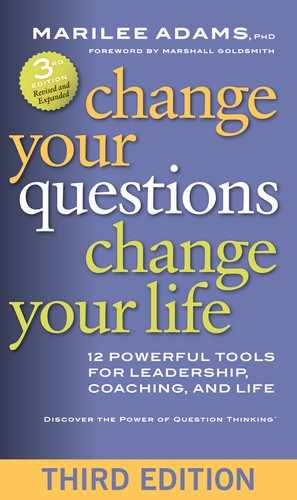END NOTES AND REFERENCES
Foreword: David Wolfskehl is the reader whose successful application of the principles of Question Thinking was described in Inc. Magazine. See Leigh Buchanan, “In Praise of Selflessness,” Inc. Magazine (May 2007).
Introduction: This quote about my work is from Coaching with the Brain in Mind: Foundations for Practice by David Rock and Linda J. Page, p. 153 (John Wiley & Sons, Inc. Hoboken, NJ, 2009).
Introduction: Wharton@Work Newsletter of Wharton Business School at the University of Pennsylvania (August 2012), Nano Tools for Leaders® “Shifting Mindsets: Questions That Lead to Results.”
Introduction: My textbook in cognitive-behavioral psychology, The Art of the Question: A Guide to Short-Term Question-Centered Therapy, was published by John Wiley & Sons in 1998 under my maiden name, Marilee Goldberg.
Chapter 2: The example of questions that drove the behavior of nomads was ascribed to psychologist Mark Brown by Michael J. Gelb in How to Think Like Leonardo da Vinci: Seven Steps to Genius Every Day (Dell Publications, New York, 2004).
Chapter 6: This quote is from Man’s Search for Meaning by Viktor E. Frankl, Beacon Press, 2006. Originally published in Austria in 1946 as … trotzdem ja zum Leben sagen: Ein Psychologe erlebt das Konzentrationslager (which translates as . . . In Spite of It all, Say Yes to Life: A Psychologist Experiences the Concentration Camp). The English translation was first published by Beacon Press in 1959.
Chapter 8: Joseph Campbell’s story of the farmer and the quote “Where you stumble, there your treasure is” comes from An Open Life: Joseph Campbell in Conversation with Michael Toms, selected and edited by John M. Maher and Dennie Briggs (Perennial Library, New York, 1990).
Chapter 8: This article describes research on the relationship between advocacy and inquiry on team performance. Frederickson L. Barbara and Marcial F. Losada, “Positive Affect and the Complex Dynamics of Human Flourishing,” The American Psychologist (October 2005), 678–686.
Chapter 9: The example about the effect on basketball teams of viewing videos of their successful moves in contrast to their mistakes is from D. Kirschenbaum, “Self-Regulation & Sport Psychology: Nurturing an Emerging Symbiosis,” Journal of Sport Psychology (1984), 8, 26–34.
Chapter 12: The concept that that “we live in worlds our questions create” relates to the Constructionist Principle of Appreciative Inquiry. See David L. Cooperrider, Frank Barrett, and Suresh Srivastva, “Social Construction and Appreciative Inquiry: A Journey in Organizational Theory,” in Management and Organization: Relational Alternatives to Individualism, edited by Dian-Marie Hosking, H. Peter Dachler, and Kenneth J. Gergen (Avebury, Aldershot, 1995).
Epilogue: Edgar H. Schein, Organizational Culture and Leadership, (Jossey-Bass, San Francisco 2010).
Tool 12: Daniel Goleman, Emotional Intelligence: Why It Can Matter More Than IQ (Bantam Books, New York, 1995).
Tool 12: David Rock, “Why Organizations Fail,” Fortune.com (October 23, 2013).
